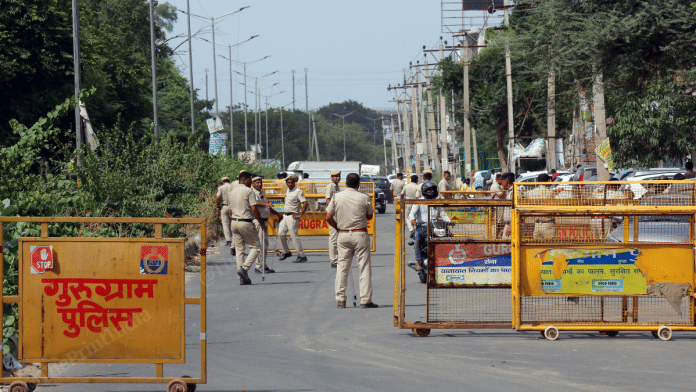Gurugram: Mobile internet and SMS services have been suspended in BJP-ruled Haryana 30 times since January 2021 — almost once every month — while Section 144 invoked more than 200 times since January 2015 in Ambala, Panchkula, Rohtak, Jhajjar and Gurugram districts, and over 100 times in Yamunanagar, Kurukshetra, Karnal, Panipat, Sirsa, Fatehabad, Rewari and Nuh.
The data was submitted the Haryana Assembly by Home minister Anil Vij during Question Hour Monday, in reply to a query by Nuh MLA and Congress leader Aftab Ahmed.
“Will the Home Minister be pleased to state — a) the number of times together with the details of places where Section 144 has been imposed from 2015 till date, and b) the number of times together with the details of places where the internet services have been discontinued during the abovesaid period along with details thereof?” Ahmed had asked.
Ahmed told ThePrint that he had made the query in the House “to make people aware of how the BJP’s divisive politics was affecting their lives”.
“The number of incidents of rioting and arson seen after the BJP came to power in Haryana in 2014 was never so high in the past. The atmosphere of hatred created by the BJP through its divisive politics is having a crippling effect on business and industry, and affecting the lives of the poor workers too,” he alleged.
“There was no hatred among people based on religion during the previous regimes in Haryana.”
“At the most, one heard stray complaints of atrocities on Dalits which the government handled very sternly,” he said, adding, “but now, the government itself has been pursuing an agenda to divide people along the lines of religion for electoral benefits.”
“This is the reason why the government needs to invoke Section 144 and suspend mobile internet services so often,” Ahmed alleged.
When ThePrint reached out to Sanjay Sharma, the BJP Haryana spokesperson argued that Section 144 was invoked as a preventive measure, and didn’t necessarily mean that there was a serious law and order issue.
“Generally, the provision is invoked near examination centres too. But that doesn’t mean that there is some issue,” he explained. “Similarly, the objective behind suspending mobile internet and SMS services is to prevent the spread of fake news and rumours so that unscrupulous elements may not vitiate the atmosphere.”
Sharma also refuted Ahmed’s allegation about the BJP “indulging in divisive politics”.
He said that Haryana Chief Minister Manohar Lal Khattar had informed the assembly during the recently-concluded Monsoon session that the “role of the Congress had come to the fore” in the Nuh communal violence, and that one of the party’s MLAs was summoned for questioning by the police.
Also Read: Who is Mamman Khan, Congress MLA summoned by police over ‘shop loot’ during Nuh violence
Data submitted in assembly
According to data submitted by Vij, mobile internet and SMS services were suspended 55 times in Haryana starting from the February 2016 Jat agitation. On most occasions, the services were suspended for multiple days.
For instance, an order was issued on 16 February, 2016, in Jind district because of the Jat agitation and the suspension continued for a month till 17 March, 2016.
Similarly, in Kaithal, mobile internet and SMS services remained suspended for 10 days from 20 February, 2016, till 29 February that year; and in Rohtak for 13 days from 18 February to 1 March, 2016.
The services were also suspended in Panipat, Sonipat, Sirsa, Faridabad, and Jhajjar for multiple days because of the Jat agitation.
The government’s data also stated that mobile internet services were suspended across the state for four days from 24 August, 2017, to 27 August, 2017, in view of the verdict in the case of sexual exploitation of women by Dera Sacha Sauda chief Gurmeet Ram Rahim Singh.
The suspension of services was extended by two days, as the verdict on the quantum of punishment was deferred from on 25 August to 28 August. On 30 August, mobile internet services in Kurukshetra, Kaithal, Sirsa, Jind, Hisar, Fatehabad and Ambala remained suspended in the aftermath of the Dera chief’s conviction.
During the farmers’ agitation, mobile internet services were suspended in Sonipat, Jhajjar and Palwal from 26 to 29 January, 2021.
The suspension order was extended to 17 districts — barring Panchkula, Gurugram, Nuh and Faridabad — for two more days. The Khattar government then kept extending it till 6 February, though the number of districts affected kept decreasing, the data showed.
In June 2022, mobile internet services remained suspended for two days in Palwal, Faridabad, Gurugram and Mahendergarh because of an army recruitment rally.
More recently, mobile internet and SMS services were suspended in Nuh after the 31 July violence. The ban orders were withdrawn on 13 August, only to be reinforced for three days starting 26 August in view of a Vishwa Hindu Parishad rally.
Under Section 144, prohibitory orders have been clamped since January 2015 on 203 occasions in Panchkula, 228 in Ambala, 165 in Yamunanagar, 183 in Kurukshetra, 178 in Karnal, 129 in Panipat, 212 in Rohtak, 200 in Jhajjar, 201 in Gurugram, 64 in Kaithal, 37 in Sonipat, 46 in Bhiwani, 24 in Charkhi Dadri, 78 in Hisar, 81 in Jind, 112 in Sirsa, 123 in Fatehabad, 113 in Rewari, 84 in Palwal, 31 in Mahendergarh, 98 in Faridabad and 110 in Nuh district, the data stated.
The government’s response also showed that on many occasions, Section 144 was invoked because of law and order concerns during the farmers’ agitation, Jat agitation and Nuh violence. On other occasions, orders were issued for an event like New Year’s Day, Republic Day, Independence Day, etc.
When Ram Rahim Singh’s movie ‘MSG: The Messenger of God’ was to be released in 2015, Section 144 was invoked in multiple districts of Haryana for two months, from 18 January to 16 March, “to maintain law and order”.
(Edited by Nida Fatima Siddiqui)
Also Read: Nuh violence got India’s attention, but Mewat wasn’t always communal






